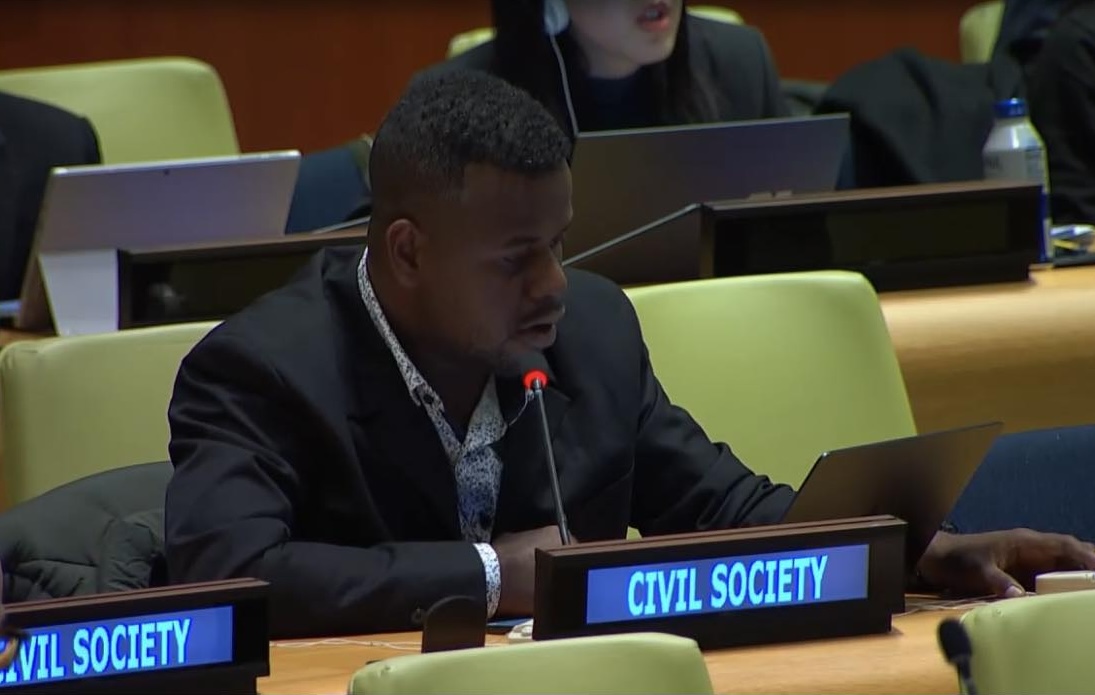
by Ronald Toito’ona
Solomon Islands and Pacific youth advocate, Maverick Peter Seda took to the global stage at the Third Meeting of States Parties (3MSP) on the Treaty on the Prohibition of Nuclear Weapons (TPNW), urging immediate action on nuclear disarmament.
The event brought together countries that are party to the Treaty, along with observers, to assess progress, challenges, and the future of the TPNW.
With participation from diplomats, foreign ministers, and senior officials, the meeting is a key platform for advancing nuclear disarmament within the UN system.
The TPNW seeks to eliminate nuclear weapons, and the 3MSP serves as a critical space for reviewing its implementation and fostering international dialogue on global peace and security.
Speaking at the high-level event, Seda, 28, who is the Coordinator of Reverse The Trend (RTT) Pacific, a youth initiative under the Nuclear Age Peace Foundation (NAPF)., boldly stated that the fight for a nuclear-free world is not just a legal obligation but a moral responsibility – which is simply everyone’s business.
“As young people, we inherit the world as it is today, but we also hold the power to shape the world we want for tomorrow. Universalization is not just a legal or diplomatic process; it is a moral responsibility and a collective movement,” Seda told the gathering.
Youth at the Forefront of Change
Seda made it clear to the audience that young people are no longer just observers in the disarmament debate—they are leading the charge.
“History has shown us that youth-led movements have the power to drive meaningful change. From climate justice to human rights, young people have stepped up where action was needed.
“The fight for nuclear disarmament is no different,” he said.

He also spoke of how Pacific youth through the RTT-Pacific are using art, storytelling, and grassroots activism to bring the nuclear issue into conversations that matter.
“We are using art, storytelling, digital campaigns, and grassroots activism to amplify the voices of those who have suffered from nuclear weapons and nuclear testing.
“In the Pacific, where the nuclear legacy remains an open wound, young people have been at the forefront of advocacy.”
He also testified that through NAPF’s Reverse The Trend Pacific, the organisation has used art and storytelling to bring the realities of nuclear harm into conversations that matter— conversations that reach policymakers, communities, and global platforms like this one.
However, awareness alone is not enough, the Solomon Islands Youth Advocate said.
“We must turn knowledge into action by equipping young people with the tools to engage in diplomacy, push for national commitments, and pressure governments that remain hesitant to join the TPNW.”
How Ratified States Can Advocate for Universalization
Seda urges governments that have ratified the TPNW to take an active role in promoting its global expansion, as the responsibility for Universalization should not rest solely with civil society.
He outlined several ways in which ratified states can help advocate for Universalization:
- Ratified states should proactively engage with non-signatory states, particularly those in their own regions, to highlight the benefits of the treaty.
- While Pacific, Latin American, and African states have already shown strong support, it is important to extend this solidarity on a global scale.
- National governments should fund public education campaigns about nuclear disarmament, collaborating with youth organizations, universities, and civil society groups.
- Parliamentary leaders should be encouraged to advocate for ratification through legislative action and policy discussions.
- Ratifying states must set an example by aligning their domestic policies with the principles of the TPNW.
- Governments can create national disarmament days, school programs, and diplomatic forums to keep the conversation about nuclear disarmament ongoing.
The RTT-Pacific Coordinator also called on states that have not yet ratified the TPNW to take action.
“The time to act is now.
“Every delay poses a risk to global peace and security.
“Nuclear weapons affect everyone, regardless of borders, and their catastrophic consequences are shared by all.
“By ratifying the TPNW, you are sending a powerful message that security comes from cooperation, not destruction,” Seda said.
Solomon Islands ratified the TPNW under the leadership of Prime Minister Jeremiah Manele on 23 December 2024.

